Safari is Apple’s sleek and efficient browser, beloved by many Mac and iPhone users. As a Windows user, I, too, was curious: could I bring that smooth Safari experience to my PC? Unfortunately, things aren’t that simple. Safari hasn’t been supported on Windows for over a decade, exposing users to security risks. So, what are your options now? In this guide, I’ll walk you through the facts, safe methods, and even better alternatives based on what I’ve tested and used myself.
Part 1: What is Safari?
Safari is Apple’s proprietary web browser, originally launched in 2003. It’s known for its clean design, fast browsing speeds, strong energy efficiency on Apple devices, and privacy-first features like Intelligent Tracking Prevention. On macOS and iOS, it’s the default browser, and honestly, it works seamlessly there. That’s part of why some Windows users, like myself, have been tempted to see if it could run on a PC as well.
Apple Discontinued Safari for Windows
However, Apple officially discontinued Safari for Windows back in 2012. The last version released was Safari 5.1.7, and since then, there have been no updates, no security patches, and no support. This means:
-
It lacks modern web standards.
-
It’s vulnerable to security threats.
-
Many websites may not display or function properly.
In short, it’s frozen in time, and that’s not ideal for browsing in 2025.
Why People Still Look for Safari on Windows
Even with the risks, I’ve noticed people (myself included) still Google «Safari for Windows.» Why? Here are the most common reasons:
-
Developers want to test website compatibility with Safari.
-
Apple fans enjoy Safari’s aesthetic and browsing feel.
-
Multi-device users want a consistent experience between Mac, iPhone, and Windows.
-
Curiosity: I’ll admit, I just wanted to see how it felt running Safari on a non-Apple machine.
If you’re in the same boat, the next section covers how you can install Safari, but with important warnings.
Part 2: How to download Safari on Windows
Although Apple no longer supports Safari for Windows, there are still a few workarounds if you’re determined to try it. Just keep in mind: these methods are mostly for testing or nostalgia—not for everyday browsing. I’ve tried them myself, and here’s how they work.
1. Download the old version (Safari 5.1.7)
This is the last version Apple released for Windows—way back in 2012. It’s available from a few third-party sources and Apple’s old support pages. But be cautious. It’s outdated and potentially unsafe for regular browsing.
Step-by-step:
Step 1: Visit a reliable archive source (e.g., TechSpot).
Step 2: Download the installer for Safari 5.1.7.
Step 3: Run the .exe file and follow the on-screen installation prompts.
Step 4: Once installed, launch Safari from your Windows Start Menu.
It looks nostalgic, but the reality is harsh: many modern websites simply don’t work right. No support for HTML5 or current security protocols makes this a risky choice for daily browsing.
2. Use online Safari testing platforms
If you’re a developer or just want to see how your site looks in Safari, using an online testing tool like LambdaTest is much safer.
Step-by-step:
Step 1: Go to LambdaTest.com
Step 2: Sign up for a free account (you get limited testing minutes).
Step 3: From the dashboard, select Real-time Testing and Safari as your browser.
Step 4: Choose a macOS version and Safari build.
Step 5: Enter your URL and start the live test.
I use this for browser compatibility testing, and it works like a charm. It’s not meant for casual browsing but is incredibly useful for checking layouts or behavior on Safari.
3. Run Safari via a Virtual Machine (VM)
For a more advanced and flexible setup, you can create a macOS virtual machine on your Windows PC and install the latest Safari there. This method mimics a full macOS system.
Step-by-step:
Step 1: Download a virtualization tool like VMware Workstation or VirtualBox.
Step 2: Create a new virtual machine and choose Apple MacOS as the guest operating system
Step 3: Set up the macOS environment and install Safari through the App Store.
This is the most «authentic» method, but it’s time-consuming and somewhat risky in terms of licensing. If you just want Safari access for testing, I’d recommend the LambdaTest route instead.
Part 3. Better alternatives of Safari for Windows users
If you’re like me and come to the conclusion that installing Safari on Windows isn’t worth the hassle or risk, you’re not alone. Thankfully, there are several modern browsers that not only outperform Safari’s old Windows version but also provide great cross-platform syncing, performance, and privacy.
Here’s what I’ve used and recommend:
1. Google Chrome – Fast, familiar, and highly compatible
Chrome is my go-to for speed and seamless syncing. It loads modern sites flawlessly, integrates with Google services, and syncs across my phone and desktop.
-
Great for Developers, multitaskers, and anyone deep in the Google ecosystem.
2. Microsoft Edge – The most underrated browser
Edge has really impressed me in recent years. It’s built on the same engine as Chrome (Chromium), but it’s lighter and has unique perks:
-
Vertical tabs
-
Collections for organizing research
-
Built-in AI tools like Copilot
-
Efficiency mode to save battery
-
Great for Office users, productivity nerds (like me!), and privacy-conscious Windows users.
3. Mozilla Firefox – Privacy-first and developer-friendly
Firefox is a long-time favorite for users who care about privacy and customization. It’s open source, blocks trackers by default, and still gives great performance.
-
Great for Privacy lovers, coders, and people avoiding Big Tech.
4. Brave – Lightweight with built-in ad blocking
If you’re tired of popups and slow load times, Brave is a fantastic choice. It blocks ads, trackers, and even YouTube ads by default.
-
Great for: Private, clutter-free browsing without extra plugins.
5. Cross-Browser Testing Platforms
If your interest in Safari is purely for testing or design validation, platforms like LambdaTest or BrowserStack are your best bet.
No installation is needed; just run Safari remotely in the cloud. I use this method frequently for client projects.
Why I Don’t Recommend Using Safari 5.1.7
After trying it myself, I can confidently say it’s outdated, glitchy, and insecure. It’s better to move on and use a current browser that offers real-time syncing, security updates, and cross-platform compatibility.
Part 4. Best Free Office Suite for Windows – WPS Office
Having a secure, fast browser is step one, but if you’re like me, you probably spend just as much time working with documents, spreadsheets, and presentations. That’s where WPS Office becomes a game-changer.
I’ve used WPS Office for both client projects and personal work, and it consistently surprises me with its clean interface, powerful features, and compatibility. It’s a true alternative to Microsoft Office without the steep price tag.
Why I Recommend WPS Office
Here’s what makes it my go-to productivity suite on Windows:
-
Word Processing – Create, edit, and format documents with ease. It even opens Microsoft Word files flawlessly.
-
Spreadsheet Calculation – I use Excel-style features for budgeting, tracking data, and analysis.
-
Presentations – The slide editor is smooth and comes with ready-made templates that save me hours.
-
Cross-Platform Support – I can switch between my Windows laptop and Android phone and even use the browser version with zero compatibility issues.
-
No Ads, No Plugins, No Viruses – Unlike some «free» alternatives, WPS Office doesn’t slow down your system or bombard you with ads.
Built-in AI Tools That Boost My Productivity
One of my favorite things about WPS Office is how AI is integrated right where I need it. Here’s how I use these tools regularly:
-
Resume Writing – I recently tested WPS AI to polish a friend’s resume, and it suggested cleaner formats and stronger action verbs within seconds.
-
AI Spell Check – It catches nuances that typical spellcheckers miss.
-
Research Paper Writing – This saved me tons of time when drafting my last article. It helps organize structure, refine tone, and even suggests citations.
-
AI PDF Analysis – I uploaded a lengthy PDF report with a summary, highlights, and even Q&A-ready content in minutes.
-
AI Slide Generation – This has made prepping client presentations so much easier. You just type in your topic, and it outlines key points with visuals.
I’ve used WPS Office for over a year now, and I honestly don’t miss Microsoft Office at all. Whether I’m writing, analyzing data, or preparing slide decks, WPS covers it all, plus it keeps evolving with smarter tools.
And just like a good browser, it keeps my workflow clean, fast, and secure.
Part 5. FAQs
1. Why did Apple discontinue Safari for Windows?
Apple shifted its development focus to macOS and iOS, where Safari is deeply integrated with system features. Maintaining a separate Windows version became less of a priority, especially with rising competition from Chrome and Edge.
It made sense from Apple’s perspective, but it left many of us cross-platform users without a native way to sync Safari across devices.
2. Is it safe to install Safari on a Windows PC?
Not really. Since Safari 5.1.7 hasn’t been updated since 2012, it lacks essential security patches and modern web support. Installing it today is like using an antique lock on a modern vault.
I tried it briefly for testing purposes, but even basic websites felt broken, and I didn’t feel safe browsing with it.
3. What are good alternatives to Safari on Windows?
I highly recommend using Chrome, Firefox, Edge, or Brave, as they are all secure, fast, and constantly updated. They offer features like cross-device syncing, tracker blocking, and PDF viewing.
If you’re doing office work, WPS Office is a fantastic companion. Its document viewer feels like a browser, and with AI features built-in, it’s replaced most of my other tools.
Summary
If you’re searching for Safari for Windows, you’re not alone; I’ve been there too. But after exploring the options, here’s the truth:
-
You can install an outdated version (Safari 5.1.7), but it’s unsafe for daily use.
-
You should use tools like LambdaTest or Virtual Machines if you need Safari for testing.
-
You’ll likely prefer modern browsers like Chrome, Edge, Firefox, or Brave, each offering a better, safer experience on Windows.
And while you’re optimizing your digital tools, don’t stop at the browser. For a truly productive Windows setup, I highly recommend WPS Office. It’s not just free; it’s powerful, intuitive, and packed with AI tools that streamline everything from writing resumes to analyzing PDFs.
I’ve replaced a full Microsoft Office subscription with WPS Office, and honestly, I haven’t looked back. Whether you’re a student, professional, or casual user, it delivers what you need without the bloat or the bill.
Safari browser, though integral to the Apple ecosystem, has steadily gained popularity due to its robust privacy features. Its emphasis on user privacy with features like Intelligent Tracking Prevention and strong security measures resonates with privacy-conscious organizations.
Its focus on performance, user-friendly interface, and robust accessibility features also attract a major fan following. In addition, its foundation on the open-source WebKit engine means that developers get access to a massive community and continuous improvement.
Features of Safari Browser
Here is a comprehensive list of Safari Browser features:
- Enhanced Privacy: Prioritizes user privacy with features such as sending out notices to users when they load insecure pages. With the customer intent in mind, Safari also removed the Do Not Track standard that otherwise would have been used as a fingerprinting variable.
- Intelligent Tracking Prevention: Proactive privacy measure that significantly limits the ability of websites and advertisers to track users across the web.
- Stronger Security: Incorporates robust security features like built-in anti-tracking, phishing protection, and a dedicated privacy report, providing users with a more secure browsing experience.
- Picture-in-Picture: Supports Picture-in-Picture mode, allowing users to watch videos in a small, floating window while continuing to browse the web or use other applications.
- Enhanced Video Playback: Offers smooth and efficient video playback with features like hardware acceleration, which improves performance and reduces battery drain.
- AirPlay Integration: This includes AirPlay integration, which allows for seamless streaming of audio and video from Safari to Apple TV, smart TVs, and other compatible devices.
- Offline Reading List: Allows users to save web pages for offline reading, making it easy to access content without an internet connection.
Can you Install Safari on Windows?
The short answer is yes, you can, but not the latest version. One of Apple’s strategic decisions in 2012 was to stop investing in supporting Safari for Windows. This decision was triggered by the need to focus on Safari features for the native iOS ecosystem.
The last stable Safari version that you can use on Windows is Safari 5.1.7. Since Apple no longer officially supports Safari on Windows, you must be cautious about using it only for testing purposes and on staging environments.
How to Download Safari on Windows
Note: Ensure that you are using Safari 5.1.7 for non-production purposes due to exposure to security vulnerabilities.
Step 1. Download Safari 5.1.7 Installer.
Step 2. Locate the downloaded SafariSetup.exe file.
Step 3. Right-click the file and choose Run as Administrator to begin the installation.
Step 4. In the installation wizard, agree to the terms and conditions.
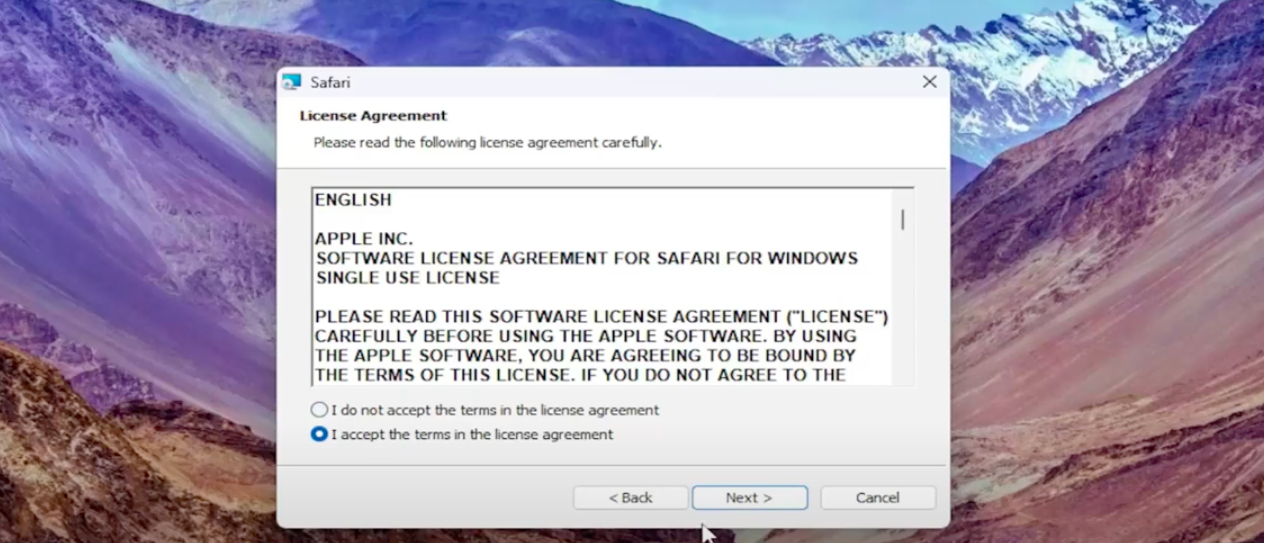
Step 5. Choose whether to install additional components, like Bonjour and automatic updates.
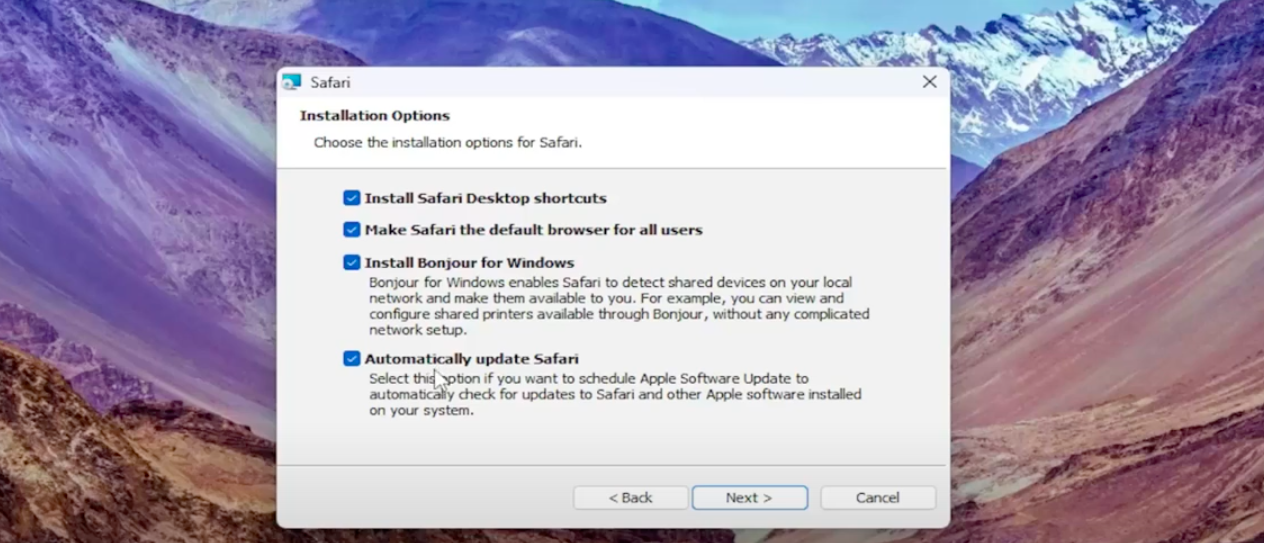
Step 6. Select the installation location.
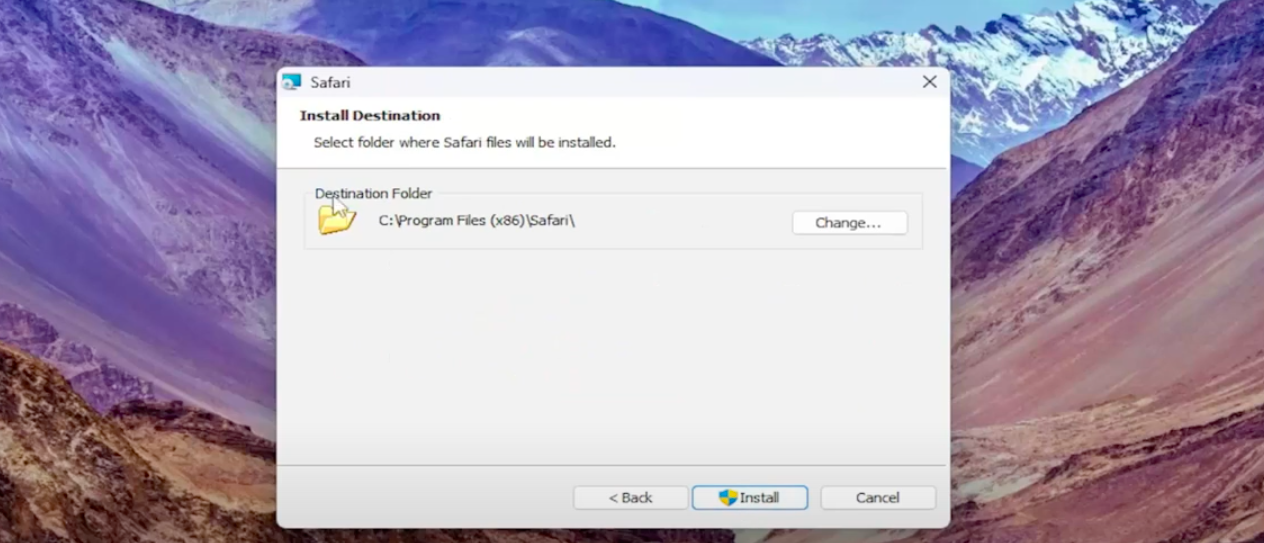
Step 7. Click Install to begin the process.
The following progress screen appears.
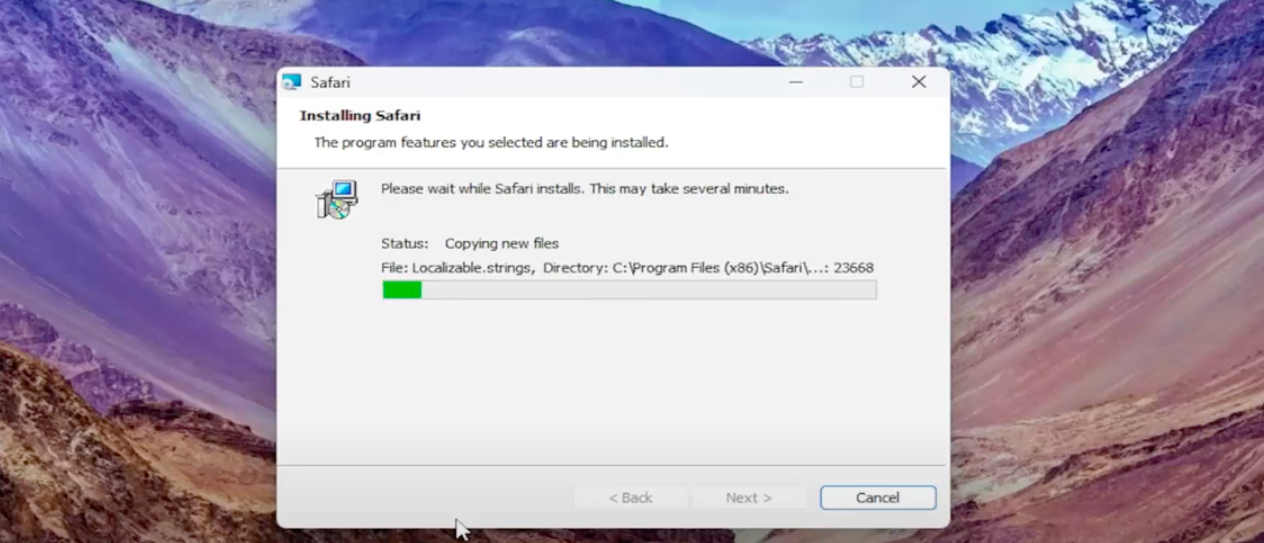
After installation completes, the following success screen appears.
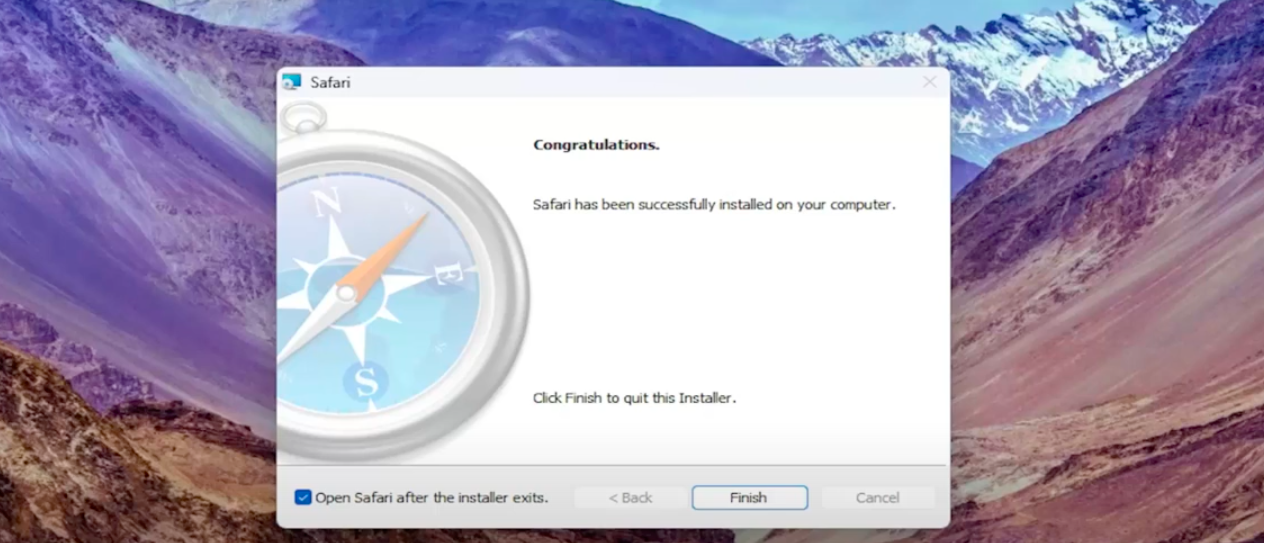
For the best experience, run the Safari browser in Compatibility Mode as follows:
- Right-click the Safari shortcut on your desktop.
- Select Properties > Compatibility.
- Check Run this program in compatibility mode and select Windows version.
- Apply the changes and try launching Safari again.
Is It Worth Installing Safari on Windows?
Though standard advice is to never use Safari on Windows because Apple no longer supports it or provides security updates, there might be situations where you need to install it.
Pros of using Safari
- Allows developers and testers to verify how their websites and applications render on Safari.
- Helps check browser-specific CSS rendering, layout issues, or font discrepancies that might occur on Safari.
- Safari 5.1.7 may be required for older web applications that need validation on this specific browser version.
Cons of using Safari
- Since Safari 5.1.7, the last version for Windows, is outdated and doesn’t reflect the current release of Safari for macOS and iOS.
- Might include unpatched vulnerabilities, making it unsafe for general browsing or handling sensitive data.
- Running such an old version on modern Windows systems may result in instability, compatibility errors, or poor performance.
Talk to an Expert
Sync Safari Browsing Data via iCloud for Windows
If you want to maintain continuity between your Safari browser data across devices, you will have to use iCloud for Safari on Windows. iCloud is the Apple cloud service app for backing up data and syncing it between different devices.
The iCloud for Windows app is specifically created by Apple that sets up an iCloud drive that you can see in the Windows File Explorer.
To sync Safari browsing data via iCloud for Windows, complete the following steps:
Step 1. Download and install iCloud for Windows from Apple’s iCloud for Windows page.
Step 2. Click Start and locate the iCloud app. Open the app and log in using your Apple ID and password.
Step 3. Select iCloud Drive, and then click Apply.
Step 4. Open File Explorer and locate the iCloud Drive
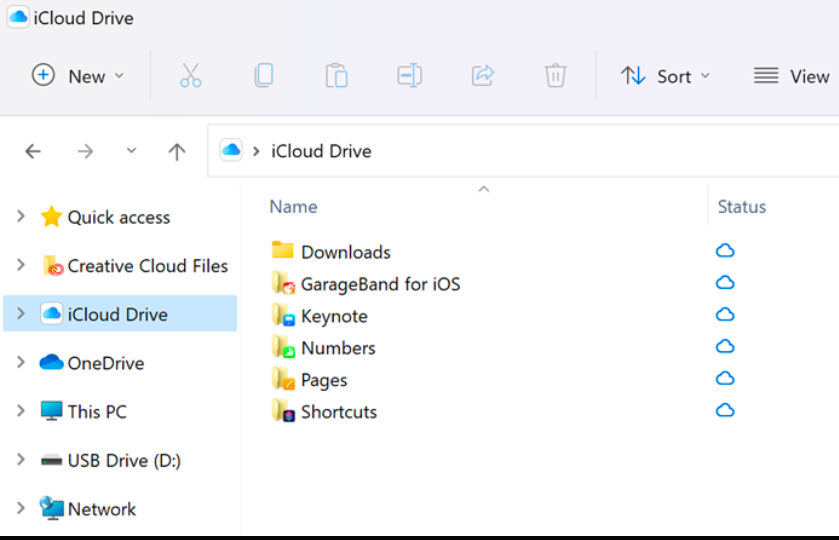
If it’s not visible, expand the Quick Access or This PC drop-downs.
Your iCloud Drive files now automatically appear in this folder. To upload files to iCloud Drive, drag and drop them into this folder.

Why choose BrowserStack to test Websites on Safari on Windows?
Whatever your use case, with the steps in this article, you can use Safari 5.1.7 on your Windows machine.
However, the official recommendation is not to open yourself to security vulnerabilities that might pop up due to the browser not being supported.
For such use cases, consider using real device cloud testing tools such as BrowserStack. BrowserStack Live/Automate provides access to more than 3500+ browser-device combinations. As it’s a cross-browser testing tool, you can quickly spin up multiple instances of Safari 5.1.7 on multiple Windows versions without the hassle of setup.
When you use BrowserStack for testing Safari on Windows, you also get access to other compelling features, such as support for multiple languages and frameworks, test run recording, CI/CD integrations, bug reporting tool integrations, observability and accessibility tools, and much more.
BrowserStack offers an option to register for a free trial to try out its line of products without any financial commitment.
Conclusion
While Safari is no longer officially supported on Windows, you can still download older versions for basic use or testing. However, due to its limitations and lack of updates, it’s better to use tools like BrowserStack for accurate Safari testing on real devices without installation hassles.
Try BrowserStack Now
If you use a Mac or an iPhone, it’s hard to pick a different browser over Safari. It’s incredibly fast, uses minimal resources, and respects user privacy. But if you also use a PC, you won’t have the luxury of installing Apple’s flagship browser on Windows since the Cupertino-based tech giant does not develop Safari for the Windows PC. That’s a major issue when your gear consists of cross-platform products.
What you can do is install an older version of Safari on Windows 10 or 11, although we highly advise against that due to compatibility and security-related issues. The best and safest option is to sync your browsing data from Safari to Chrome or Edge on your PC via iCloud for Windows. Setting up macOS on your PC and using Safari that way is another feasible option.

Download and Install Safari on Your Windows PC
Apple halted the development of Safari for Windows in 2012. However, the final version of the browser (Safari v.5.1.7) is freely available on the internet, so you can quickly download and install it on your Windows 10 or 11 PC. The problem? It’s terribly slow and dated, lacks compatibility with most web apps, and poses security risks. You also can’t sync your browsing data, so it’s not a solution if you want to access bookmarks and passwords.
Regardless, the steps below will walk you through downloading and installing Safari on your Windows 10/11 PC. But unless you just want to have a feel of how Safari looked almost a decade earlier, we recommend you stay away from it.
1. Download the Safari installer from a software download portal such as Uptodown, Filehippo, or TechSpot. It weighs in at 36.7MB. Unfortunately, Apple no longer supports Safari for Windows, so you can’t get it from an official source.
2. Double-click the downloaded SafariSetup executable file.
3. Select Next on the Safari Setup’s Welcome screen.

4. Accept the license agreement and select Next.

5. Specify if you want to add Safari as a desktop shortcut or not. Also, decide if you prefer it as the default browser on your computer (we recommend you don’t select this option). Select Next to continue.

6. Pick an install directory (or leave the default folder path) and select Install.

7. Wait for the Safari installer to finish installing Safari on your computer. Then, select Finish.

After installing Safari, you can choose to open it by double-clicking the Safari icon on the desktop. Or, you can open it by selecting Safari on the Start menu’s programs list.
Despite being almost ten years old, Safari for Windows doesn’t look too out of place. To the top, you have the familiar URL bar (you can’t use it to perform searches, however), a Bookmarks strip underneath, and a dedicated Search bar on the left corner. By default, new tabs display frequently visiting sites in thumbnail format—you can use the Top Sites and History tabs to switch them and your browsing history.

Selecting the cog-shaped icon at the right corner of the screen reveals the Safari menu, where you can choose to customize the toolbar, access your browsing history, launch a private browsing window, and so on.

Selecting Preferences opens the Preferences pane, which provides options to modify the homepage, pick a default search engine, adjust privacy settings, manage extensions (although extensions support is non-existent), etc.

What the browser does not allow is to sign in with an Apple ID. That makes it impossible to sync your browsing data from an iPhone or Mac. Even if the functionality were present previously, Apple probably would’ve stopped you from signing in to it by now.
During our Safari tests on Windows, the browser started showing its age. Most websites took a long time to load, while web apps (such as YouTube and Google Maps) simply failed or prompted us to switch to a compatible browser. Other than for basic web browsing, it was practically useless.
Safari for Windows also hasn’t received security updates in almost a decade, so we recommend that you don’t attempt to use it for any sensitive activities such as banking or shopping.
Sync Safari Browsing Data via iCloud for Windows
If your gear consists of a PC and iPhone or Mac, you can sync your passwords and bookmarks from Safari with Google Chrome and vice-versa by installing iCloud for Windows. That’s the most convenient method for accessing your browsing data on each platform.
iCloud for Windows also offers password syncing for Microsoft Edge and bookmarks syncing for Mozilla Firefox. However, only Chrome receives support for both.
If you don’t have iCloud for Windows on your PC, you can get it via the Microsoft Store or the Apple website. If you already have it, make sure to upgrade it to at least version 12.5 or later (you can do that via the Microsoft Store’s Downloads and updates screen or by running the Apple Software Update applet).
With iCloud for Windows up and running, open the iCloud app and check the boxes next to Passwords and Bookmarks. You can also activate additional iCloud services such as Photos and Drive if you want.

Follow that by installing the iCloud Passwords on Google Chrome or Microsoft Edge. The former lets you insert and save passwords to the iCloud Keychain. You can also use the iCloud Passwords app (which installs automatically alongside iCloud for Windows) to manage your passwords in Windows. On the other hand, the iCloud Bookmarks extension syncs passwords between Chrome/Firefox and Safari.
Download: iCloud Passwords (Chrome)
Download: iCloud Bookmarks (Chrome)
Download: iCloud Passwords (Edge)
Download: iCloud Bookmarks (Firefox)
Run Safari via a macOS Virtual Machine
If you want to use the most recent version of Safari on your PC (perhaps to test a feature or extension), the only way you can do that is by running macOS via virtualization software. However, the procedure is not convenient. For starters, Mac’s operating system is not natively supported by most VM software, so installation generally relies on workarounds relying on additional software. Also, it requires lots of free disk space and uses up system resources, not to mention that virtual machine guests generally run sluggishly compared to the host operating system.
If you still want to go ahead and install macOS, the easiest way to do that is by following the instructions within this macOS Virtualbox project on GitHub. It lets you install macOS Catalina as a virtual machine via a Bash script. We’ve condensed it into the following steps:
1. Download and install Oracle VM VirtualBox on your PC (it’s free).
2. Download and install Cygwin with the following dependencies (you can select them during installation).
- bash
- coreutils
- gzip
- unzip
- wget
- xxd
- dmg2img
3. Download the macos-guest-virtualbox.sh bash script from GitHub.
4. Open the Cygwin Terminal. Then, drag and drop the bash script and press Enter.
5. Follow the on-screen instructions to set up macOS as a virtual machine on your PC.
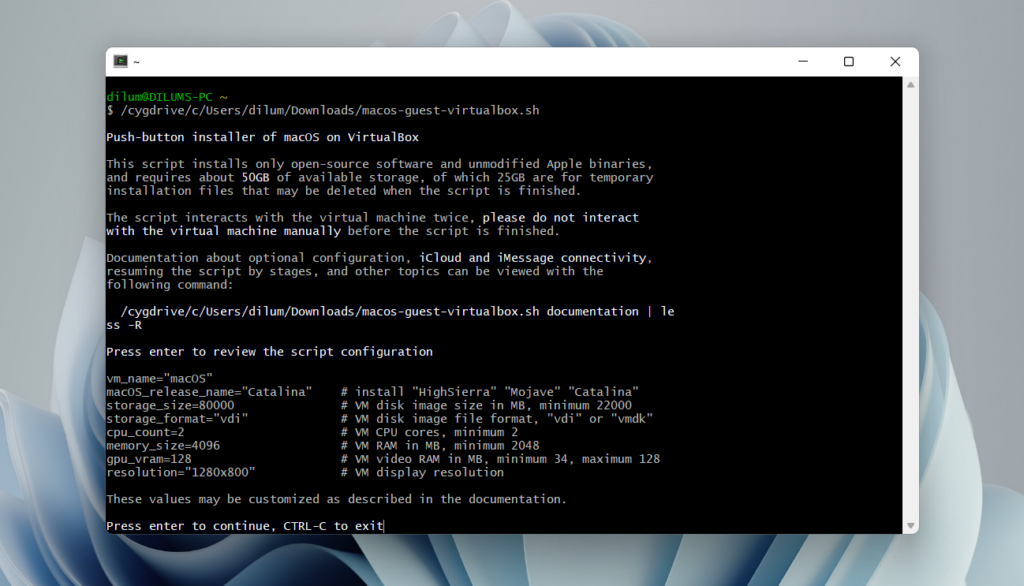
After the setup procedure, you can open and use Safari by selecting the Safari icon on the Mac’s Dock. Before you do that, however, it’s a good idea to update macOS and Safari. To do that, open the Apple menu and select System Preferences > Software Update > Update Now.
iCloud for Windows Is the Most Convenient
Although it’s possible to download and install Safari on your Windows 10/11 computer, we recommend you stray away from it. The security risks alone make it impractical, and it’s not like you can use it for any serious web browsing anyway due to compatibility issues.
Since the most likely reason you would want to install Safari involves syncing your passwords and bookmarks, using iCloud for Windows is the only viable alternative. But if you do have the time and just want to try out the latest version of Safari, your best option is to set up macOS as a virtual machine on your PC.
Related Posts
- How to Fix a “This file does not have an app associated with it” Error on Windows
- How to Fix an Update Error 0x800705b4 on Windows
- How to Resolve “A JavaScript error occured in the main process” Error on Windows
- How to Fix the Network Discovery Is Turned Off Error on Windows
- How to Change Folder Icons in Windows
Apple was at one time somewhat interested in cornering the browser market. To that end, it made its own browser, Safari, available outside macOS i.e. it was available for Windows. Unfortunately, the browser is no longer being developed for Windows and all traces of it have been removed from Apple’s website.
While Safari for Windows is no longer being developed, the older versions of the browser are still available from Apple. Finding them is just a bit hard.
Download Safari for Windows, And Install
To install Safari for Windows 10 (or earlier), follow these steps.
- (http://appldnld.apple.com/Safari5/041-5487.20120509.INU8B/SafariSetup.exe) Visit this link and download Safari (Download starts automatically).
- Run the executable file.
- Agree to the EUA and choose if you want to set it as your default browser.
- Click Install.
- The browser will be installed.
Limitations
This version of Safari is extremely outdated. It was abandoned in 2012 and it fails to load many, many websites. It’s not ideal for browsing and it certainly isn’t ideal for testing a web app.
Websites that do load in this older version of Safari may not be safe. Google is the exception here but websites that are loading likely have not updated their security protocols which is why they’re still accepting a connection from the outdated browser.
If you have a web app that you need to test in Safari, you only have two options; using a Mac or creating a virtual machine and running macOS in it.
Barring these two options, there is no way you will be able to use the test version of Safari for testing or anything else.
Run Safari in Compatibility mode
If you’re determined to use this outdated version of Safari on Windows 10, you can try running it in compatibility mode. There are no guarantees that it will run better since web protocols are involved and they do not care for the compatibility mode.
- Create a desktop shortcut for Safari.
- Right-click the shortcut and select Properties from the context menu.
- Go to the Compatibility tab.
- Enable the ‘Run this program in compatibility mode for’ option.
- Select an older version of Windows from the dropdown and click Apply.
Conclusion
Safari is a reasonably good browser but this only holds true for its newer versions. Running the outdated Windows version will not give you any benefit that the browser has. In fact, it’s a security risk. It’s worth mentioning that while Safari is the default browser on macOS, not all Mac users use it.
Plenty of users still prefer to use Chrome or Firefox. Safari has a few good extensions but again, this old version will not be able to run any of them.
One final alternative is to fake your user agent and have websites think you’re visiting from Safari.

Fatima Wahab
Fatima has been writing for AddictiveTips for six years. She began as a junior writer and has been working as the Editor in Chief since 2014.
Fatima gets an adrenaline rush from figuring out how technology works, and how to manipulate it. A well-designed app, something that solves a common everyday problem and looks
Safari is one of the best browsers apart from Brave, Google Chrome, and Firefox. Almost every Apple user uses Safari as their default web browser on their MacBook as it is one of the most secure browsers. Now if you just switched from Mac to Windows OS then this article can help you to get Safari for Windows 11/10.
Earlier, Safari wasn’t available for Windows but now you can use Safari on Windows 11. Wondering how you can do that? In this article, we will share a working method for how to download the Safari browser on Windows 11.

Is Safari Compatible with Windows 11?
Apple hasn’t released an official version of Safari for Windows 11 but you can still use it. So, Safari is only partly compatible with Windows 11. Apple ended Windows support for Safari in 2012 when it launched Safari 6 just for Mac users.
So, for a long time, Apple hasn’t launched an updated version of the Safari browser for Windows. On Microsoft’s Windows 11, you can still use the current Safari browser.
Safari 5.1.7 is the last and most stable version of Windows 11. Note that you won’t be able to use the latest Safari browser features as it is an older version.
To download Safari on Windows 11, you will need to use the setup wizard for version 5.1.7. Follow these steps to download and install the Safari browser on Windows 11.
- First, open the official website of Safari and then go to the downloads section.

- Now find and click on the Safari browser icon on the top and then click on the Download button as mentioned below.

- Save it on your desktop.
How to Install Safari Browser on Windows 11 PC or Laptop
Once you download the browser, here’s how you can install Safari on Windows 11 system.
- Double click on the Safari setup file from your desktop to install it. It will open a setup wizard window.
- Click on next and you will see license agreement details.
- Agree to the license agreement by clicking on the I accept ratio button.

- Follow all other on-screen instructions and select the required installation options to install the Safari browser on Windows 11.
- If you want to change the installation location then you can change it while installing process. Or you can just skip this step.

- Click Install and then click on Yes of UAC alert shows up.
Once installed, click on the open Safari browser option from the desktop shortcut or using the Windows search box and start using Safari on Windows 11 without any hassles! This completes the Safari download for Windows 11 process.
Update: Few users aren’t able to see the Safari download option on their PCs on Apple’s official website and it’s redirecting to this page instead which reads “Apple no longer offers Safari updates for Windows. Safari 5.1.7 for Windows was the last version made for Windows, and it is now outdated.” In that case, here’s an alternative method to download Safari for Windows 11.
Alternative Way to Download Safari on Windows 11
To get Safari for Windows 11 even when Apple has stopped the support, you need to download Safari from a third-party website like this one.
Although, it’s not recommended to install Safari from such third-party websites as it may have adware and some freeware but if you still want to use it at any cost, that’s up to you. We do not endorse it but upon our readers’ request, we’ve provided the Safari download for Windows 11 link.
Here’s a video that shows the entire process of installing Safari on Windows 11 using third-party download links.
Features in Safari 5.1.7 Explained!
When Safari is running on Windows 11, you can use some awesome features. Here are some tips that will improve your browsing experience.
To add a new site, click Edit. Then type the website’s URL in the address bar, but don’t hit Enter. Click the small globe icon to the left of the website address and drag it onto a top site’s thumbnail.
Safari comes with a Reading List function. To view it, click the Show Reading List button. To add a webpage to the sidebar, click Add page.
Safari’s Bookmarks Bar now offers page thumbnail previews. To see it, select Show all bookmarks from the browser’s left side.
Safari’s URL toolbar can be customized. To do so, click the Show a menu button in the browser’s upper right. Select Customize Toolbar to bring up the popup shown below:
Safari even allows access to banned websites. Parental Control settings are best for Mac users.
Can I Use the Latest Version of Safari Browser with Windows 11?
The only way to install the latest version of Safari for Windows 11 or 10 is by using virtual machine tools like VMWare or Virtual Box. You can even install and use all the Apple products that are not available for Windows.
The entire process takes little time and it is a very complex process. So you have to take care while setting up and installing Safari on Windows 11 using virtual machine tools. At times, your system might get slow too as the virtual machine requires higher CPU resources and RAM too.
In such cases, it’s better to use Windows 11 Safari browser as mentioned in the above method. But if you’re a developer and want to test out how the latest Safari version behaves on Windows 11 operating system, virtual machine tools are your best bet!
Related Posts:
- How to Find What is Running in Windows 11
- How to See Other Computers on Network in Windows 11
- How to End a Program’s Task in Windows 11
Well, that ends up the tutorial on how you can download the Safari browser for Windows 11. Do not hesitate to reach out to us on Twitter if you’ve any issues regarding the installation of the browser or any other problem you face.
